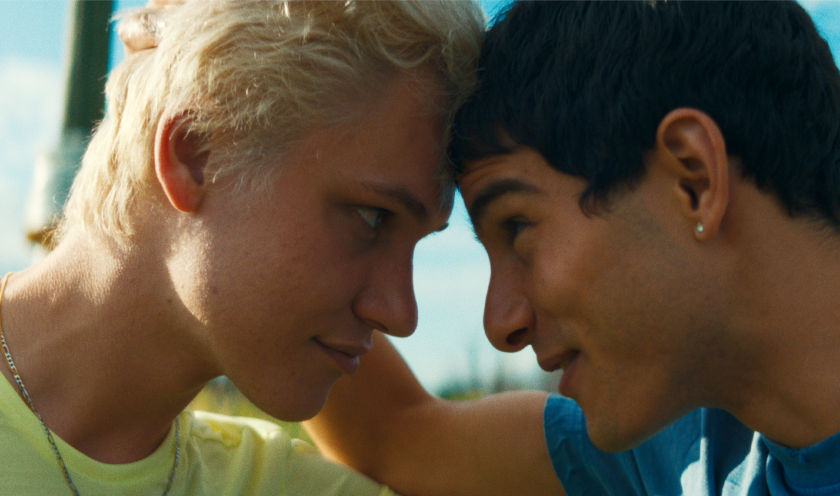Vassilis Kroustallis reviews 'Block Pass' by the French director Antoine Chevrollier.
Ghosts seem to haunt a too shiny French urban spot, in Antoine Chevrollier's empathetic and character-driven feature film debut 'Block Pass (La Pampa)', premiering at Critics' Week at the Cannes Film Festival. Chevorllier presents his LGBTQ+, coming-of-age story as a big, unanswered question: why do we keep believing in ghosts (prejudices, illusions of a serene traditional life) when reality has already surpassed our expectations?
This is what the two main characters, Willy (Sayyid El Alami) and Jojo (Amaury Foucher) have set out to do; both children of dead or non-understanding fathers, they find solace and a refuge in the much masculine sport of motor racing in La Pampa, a motocross field in the Angers area that serves as the qualifying step for the French Supercross championship. Their bonding is genuine; the blond Jodo is the fearless one -we'll get to the point by watching the film's energized opening scene. We'll have a second chance when the first round of the motocross race starts (in which kinetic camera movements predominate). Yet Jojo comes second, and a disappointing father (a magnificent Damien Bonnard), who sees his son more as an investment than a living being, sets things off.
The rebel phase of the film in the first act has Willy flirting with Marina (Leonie Dahan Lamort), a presumed sexual connoisseur far away from the conservative atmosphere of Longué, where the characters live (and Willy still needs to complete his studies). A disclosure of Jojo's gay secret sets the ball rolling -and now the two rebel youngsters become the hunted, and their friends their fervent enemies.
Chevrollier and his co-screenwriters Bérénice Bocquillon and Faïza Guène aim for some key narrative surprises. They mostly succeed, even though the film has the distant feeling of an episodic affair and too-neat-and-tidy dramatic moments (we also have another dramatic event that involves Jojo in the film's first-hour mark). Still, Chevorllier focuses cleverly on Willy, who has to absorb the different incoming events and sentiments (with a homophobic tidal wave addressing his best friend) -and El Alami is superb in putting those sentiments into sincere action, surprise, anger, and bereavement.
In a film that could have been overtly emotional or even impressionistic, Chevorllier keeps a hard rein on a realistic take including both his cinematography (Benjamin Roux) and his scene composition; only the initial boys' bonding scene in an abandoned place has the feel of a mystique (this is the place where Jojo and Willy invoke the ghosts). The soundtrack (by Evgueni and Sacha Galperine) helps isolate the emotional need for some breathing space in the film's otherwise harsh (but not disturbing) rural world it depicts.
The third act feels forced at times, a much-needed substitution of non-existing ghosts by Willy and Jojo's father; some other characters (like Marina) disappear from the foreground once their supporting narrative work has been completed. Yet overall, 'Block Pass' has both the energy and the calculated feeling to construct a world in which homophobia may rule as the invisible sign of the present -and where motocross bikes become the masculine ghost that needs to be preserved. The film has stamina, and a committed feeling to present characters fighting against yesterday's ghosts.
Vassilis Kroustallis
'Block Pass' (La Pampa) premiered at the 2024 Cannes Film Festival (Semaine de la Critique).

